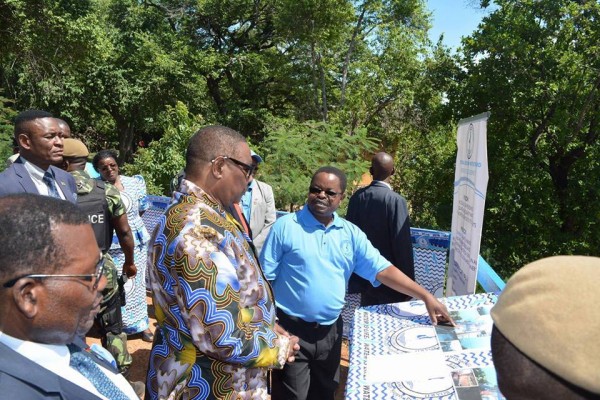![Mutharika: Clean and portable water is a must for every citizen]()
President Peter Mutharika has directed all water boards in the country to venture into large scale irrigation programmes to avert persistent food shortages in the country blamed on El Nino weather phenomenon.
[caption id="attachment_107707" align="alignright" width="600"]
![Mutharika: Clean and portable water is a must for every citizen]()
Mutharika: Clean and portable water is a must for every citizen[/caption]
[caption id="attachment_107706" align="alignright" width="600"]
![President Mutharika commissioned the Salima Lake Shore Water Supply project]()
President Mutharika commissioned the Salima Lake Shore Water Supply project[/caption]
Mutharika said this on Friday when he officially commissioned a K6.4 billion World Bank funded Salima Water Supply Scheme.
"We have water that is supplied in our homes, we have water that irrigates our gardens... but we don't have water that irrigates our crops, what is the problem? Provide water to our farmers, I want you to supply to farmers wherever you can. I must receive your plans by mid June,” Mutharika said.
The President this week declared Malawi a state of national disaster following persistent acute food shortages because of El Nino powered heavy rains in the north and El nino powered drought in the south leaving the central region. To feed a population of close to 20 million people.
"We have a lot of water but what we need is skills and resources,” he said.
Mutharika said if the water boards initiated irrigation system takes off, Malawi would be food secure in two to three years time.
He said Agriculture is now the priority of all priority areas of his government nd irrigation is the main focus.
"If we do this, we will be back on track in two to three years, there will be no food shortages. We will do that," said Mutharika.
Mutharika thanked the US government for the US$50 million food aid pledge, saying this is a third of what Malawi needs in this food shortage period.
Malawi is expected to have 2.4 million metric tonnes of maize this year out of the need three million metric tonnes needed, putting over three million people in dire need of the staple food.

 Mutharika: Clean and portable water is a must for every citizen[/caption]
[caption id="attachment_107706" align="alignright" width="600"]
Mutharika: Clean and portable water is a must for every citizen[/caption]
[caption id="attachment_107706" align="alignright" width="600"] President Mutharika commissioned the Salima Lake Shore Water Supply project[/caption]
Mutharika said this on Friday when he officially commissioned a K6.4 billion World Bank funded Salima Water Supply Scheme.
"We have water that is supplied in our homes, we have water that irrigates our gardens... but we don't have water that irrigates our crops, what is the problem? Provide water to our farmers, I want you to supply to farmers wherever you can. I must receive your plans by mid June,” Mutharika said.
The President this week declared Malawi a state of national disaster following persistent acute food shortages because of El Nino powered heavy rains in the north and El nino powered drought in the south leaving the central region. To feed a population of close to 20 million people.
"We have a lot of water but what we need is skills and resources,” he said.
Mutharika said if the water boards initiated irrigation system takes off, Malawi would be food secure in two to three years time.
He said Agriculture is now the priority of all priority areas of his government nd irrigation is the main focus.
"If we do this, we will be back on track in two to three years, there will be no food shortages. We will do that," said Mutharika.
Mutharika thanked the US government for the US$50 million food aid pledge, saying this is a third of what Malawi needs in this food shortage period.
Malawi is expected to have 2.4 million metric tonnes of maize this year out of the need three million metric tonnes needed, putting over three million people in dire need of the staple food.
President Mutharika commissioned the Salima Lake Shore Water Supply project[/caption]
Mutharika said this on Friday when he officially commissioned a K6.4 billion World Bank funded Salima Water Supply Scheme.
"We have water that is supplied in our homes, we have water that irrigates our gardens... but we don't have water that irrigates our crops, what is the problem? Provide water to our farmers, I want you to supply to farmers wherever you can. I must receive your plans by mid June,” Mutharika said.
The President this week declared Malawi a state of national disaster following persistent acute food shortages because of El Nino powered heavy rains in the north and El nino powered drought in the south leaving the central region. To feed a population of close to 20 million people.
"We have a lot of water but what we need is skills and resources,” he said.
Mutharika said if the water boards initiated irrigation system takes off, Malawi would be food secure in two to three years time.
He said Agriculture is now the priority of all priority areas of his government nd irrigation is the main focus.
"If we do this, we will be back on track in two to three years, there will be no food shortages. We will do that," said Mutharika.
Mutharika thanked the US government for the US$50 million food aid pledge, saying this is a third of what Malawi needs in this food shortage period.
Malawi is expected to have 2.4 million metric tonnes of maize this year out of the need three million metric tonnes needed, putting over three million people in dire need of the staple food.